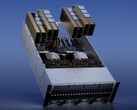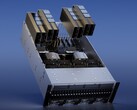Nvidia plans to ship the RTX 6000D in the third quarter of 2025, targeting up to two million units by year-end. The Blackwell-based card is built on TSMC's 4 nm process. It carries GDDR7 memory, delivering around 1,100 GB/s bidirectional bandwidth-figures designed to skirt current U.S. export thresholds while still approaching HBM-class performance.
Chief executive Jensen Huang underscored the effort with a third visit to China this year on 14 July, presenting the RTX 6000D and other compliant GPUs to key partners under close U.S. scrutiny. The trip signaled Nvidia's determination to rebuild a market that once generated more than 13 percent of annual revenue.
Export controls have weighed heavily on the company since 2022. Successive bans first blocked the A100 and H100, then their down-clocked A800 and H800 replacements, and finally the H20 and even high-end gaming cards such as the RTX 4090 and 5090D. Because of the restrictions, Nvidia has already booked $4.5 billion in inventory impairments and written off a further $2.5 billion in unrealized revenue.
Analysts note that Chinese rivals-Huawei, Cambricon, and others-continue to chase domestic AI silicon yet still face production limits at SMIC, steep costs, bandwidth bottlenecks, and a software gap versus CUDA. Those hurdles, combined with Nvidia's near-monopoly in AI GPUs, leave the RTX 6000D well-positioned if the company can secure enough GDDR7 in the year's second half.
A smooth rollout would further lift TSMC's 4 nm utilization and could restore a significant share of Nvidia's China revenue, which fell below five percent after the latest bans. The RTX 6000D, therefore, serves as both a commercial lifeline and a fresh test of how far U.S. regulators will allow downgraded AI hardware to go.
Source(s)
Digitimes (in English)














